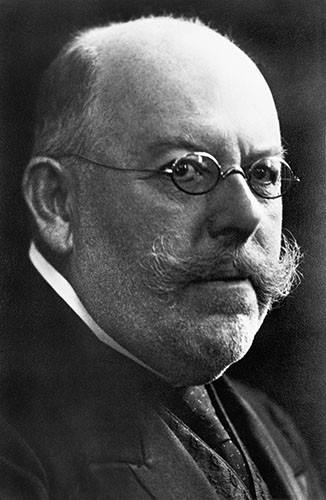
The name giver for the FLI
Friedrich August Johannes Loeffler
born 24 June 1852 in Frankfurt (Oder)
died 9 April 1915 in Berlin
Vita
Loeffler was a physician, hygienist, bacteriologist and the founder of the science of virology. From 1870 to 1874 he studied medicine in Würzburg and Berlin. After studying, Loeffler worked as a military physician before becoming principal assistant to Robert Koch at the Imperial Health Office in Berlin in 1879. He discovered the causative agents of various infectious diseases such as glanders and erysipelas. With the discovery of the causative agent of diphtheria in 1884, he laid the groundwork needed to develop effective remedies and protective vaccines. In 1888, Loeffler became Professor for Hygiene at the University of Greifswald.
In 1897, he was commissioned by the state to do research into foot- and -mouth disease. Together with Paul Frosch, he identified the pathogen as an ultrafilterable, replication-competent particle, smaller than a bacterium. They concluded that a novel type of pathogen must exist: viruses. Loeffler and Frosch are therefore rightly regarded as the founders of virology. Loeffler succeeded in producing the first protective serum against foot- and -mouth disease.
In 1910, Loeffler founded the world’s first virological research facility on the island of Riems, which he headed until his appointment as director of the future Robert Koch Institute in 1913.
Loeffler worked in Greifswald for more than 25 years. He was active in the city assembly, modernized disease control and hygiene, and brought about the construction of the Greifswald sewage system. In 1913, the city granted him honorary citizenship. Loeffler died at the age of 62 in Berlin. His grave is at the "Old Cemetery" in Greifswald.

